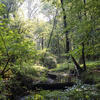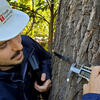The Field Station provides research and educational facilities for the Temple community in addition to welcoming external researchers and educators. Research initiatives at the Field Station span disciplines and vary in scope from small-scale, short-term projects by student interns to long-term engagement in regional and global science networks.
Each semester, the Field Station hosts a suite of courses in ecology, conservation, and related fields, many of which have both classroom and field components. The Field Station also trains early career scientists through a dynamic internship program that provides dozens of students each year with a supportive environment for in-depth, hands-on training and mentoring in the practice of field research.
Building on Temple Ambler's long-standing commitment to environmental stewardship, the Field Station works alongside other active groups onsite, including the Ambler Arboretum of Temple University, the Ambler Campus Greenhouse Education and Research Complex and the undergraduate and graduate programs in Landscape Architecture and Horticulture. Together, these groups continue the environmental legacy of the Pennsylvania School for Horticulture for Women, which was founded in 1911 on what would later become the Temple University Ambler Campus in 1958.
The Temple Ambler Field Station is a member of the Organization of Biological Field Stations and other international networks for the advancement of environmental research and education.
Stay Connected
The Field Station is also active in public outreach, sharing our enthusiasm for nature and field studies with a broad audience. To keep connected to the latest news, please follow the Temple Ambler Field Station online — @tufieldstation on Instagram, X (Twitter) and Linkedin!


